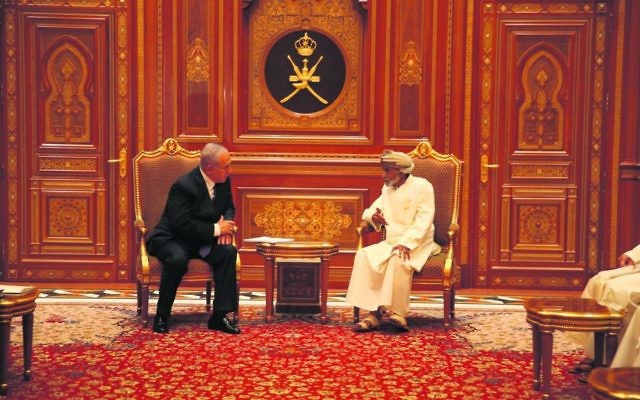Boosting ties with the Arab world
Israel's new ties with Arab countries are suddenly becoming public, after three leading Israeli politicians paid visits to Gulf states and Hatikvah played in Abu Dhabi.
ISRAEL’S new ties with Arab countries are suddenly becoming public, after three leading Israeli politicians paid visits to Gulf states and Hatikvah played in Abu Dhabi.
Prime Minister Benjamin Netanyahu has just been to Oman, together with his wife Sara and top security officials from Jerusalem.
They were invited and hosted by Oman’s ruler, Sultan Qaboos bin Said Al Said, on what was called an “official diplomatic visit”, even though the two countries don’t have diplomatic relations.
Shortly after Netanyahu returned from Oman, his colleague Miri Regev, Israel’s Culture Minister, was given the red carpet treatment in the United Arab Emirates.
State officials showed Regev around the world’s third largest Muslim house of worship, Abu Dhabi’s Sheikh Zayed Grand Mosque, and she lauded its message of “peace”. Israel’s Communications Minister Ayoub Kara then attended a communications conference in the UAE city of Dubai, where he spoke of peace.
Netanyahu regularly says that he is working on improving Israel’s connections with Arab countries – especially those who are considered allies against Iran – but rarely gives details. Now, there are tangible results – and also, by way of Regev’s trip, an indicator of just how quickly relations between Israel and the Gulf states are advancing.
Regev was visiting to watch a judo contest, the Abu Dhabi Grand Slam, where last year organisers refused to fly Israel’s flag or allow the anthem to be played. This year, the flag was flown, and when Sagi Muki won gold in the under-81 kilogram category, the emcee said: “Ladies and gentlemen, please rise for the national anthem of Israel.”
Tears rolled down Regev’s face as she sang the anthem, standing next to a local official who was in traditional dress. Netanyahu told Muki in a phone call that he had brought glory to Israel by winning gold and is also “contributing to Israel’s diplomatic effort in the Arab world”.
The developments in the UAE and Oman come just over six months after Saudi Arabia’s crown prince Mohammed bin Salman said that Israelis “have the right to have their own land”, and since Israel-bound planes started flying through Saudi airspace.
The growing closeness with the Gulf states is in contrast to Israel’s relationship with the Palestinian leadership, which went further into crisis this week. The Palestine Liberation Organisation (PLO) voted to suspend its recognition of Israel and end commitments it made to Israel in agreements.
The resolution, passed by the PLO’s top committee, included a decision to “end security coordination in all its forms, and disengage economically from Israel”. It is likely to remain a non-binding decision, as Palestinian President Mahmoud Abbas was given discretion on whether or not to act on it.
NATHAN JEFFAY


comments